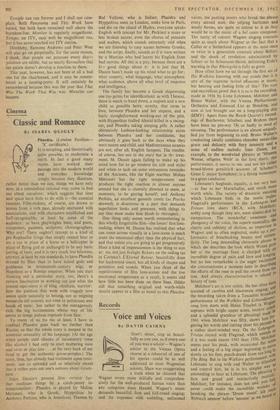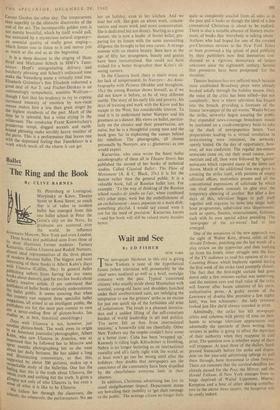Records
Voice and Voices
By DAVID CAIRNS
SPECTATOR, DECEMBER 28. 1962 voices, the panting tenors who break the phrase every second note, the yelping baritones and woofy basses, are quite as untrue to it as they would be to the music of a be! canto composer. The rarity of correct Wagner singing conceals quite as much about Wagner as the fact that a Callas or a Sutherland appears at the most once or twice in a generation conceals about Bellini; and the shock of revelation administered by Schorr or by Schumann-Heink delivering Erda's warning in Das Rheingold is fully as great. How often have we sat through the first act of Die Walk/ire knowing with our minds that it is one of the supreme lyrical effusions in music, but hearing and feeling little of this? The rare and marvellous proof that it is so is the recording, made in 1936 by Lotte Lehmann, Melchior and Bruno Walter, with the Vienna Philharmonic Orchestra and Emanuel List as Hunding, and now at last brought out on a long-playing disc (HMV). Apart from the Busch Quartet's record- ings of Beethoven, Schubert and Brahms there have been no pre-war 78s so badly in need of reissuing. The performance is an almost unquali- fied joy from beginning to end. Bruno Walter's conducting ideally combines chamber music-like grace and delicacy with fiery intensity and a sense of endless melodic lines (listen, for example, to the woodwind phrases at `Siisseste Wonne, seligstes Weib' in the love duet); this performance, it seems to me, and not his rather broad-blown genii/dial account of Schubert 's Great C major Symphony, is a fitting monument to a great conductor. Lehmann's Sieglinde, equally, is her very hest —as fine as her Marschallin, and much more worth while. The variety of dramatic meaning which Lehmann finds in the music makes Flagstad's performance in the Lohengrin arid Tristan love duets (RCA, with Melchior), nobly sung though they are, seem almost dull bY, comparison. The wonderful sweetness an" plangency of the voice, the superb musicality, the clarity and subtlety of diction, so important ha Wagner and so often neglected, make up a Per- formance of breathtaking beauty and atallen.4 ticity. The long descending chromatic phrase la which she describes the look which Wotan gavne her at the marriage feast is charged with incredible degree of pain and love and lorigihg:. but no less remarkable is the eager exciterneht she communicates a moment later in describinge the efforts of the men to pull the sword from ttl„ tree. And always characterisation is related tu beauty of tone. en Melchior's art is less subtle. He has often be e0 a accused of careless and inaccurate singing; Oil. the recording taken from a Toscanini broadca: performance of the Walkiire and Gatterdeittline'r rung love duets with Helen Traubel (a Wagrick soprano with bright upper notes, incisive attain and a splendid grandeur of phrasing) madefor.. 1941 when Melchior was fifty, shows h1;0 getting his words and cutting short his phrases.L, a rather short-winded way. On the Lohettgr";s Tristan record with Flagstad, which sotInd?_:,,r if it was made nearer 1941 than 1936, e lc nolt:s seems past his peak, with occasional flat ttove and a feeling of a big singer beginning to 111 in slowly on his feet, punch-drunk from too long,„ The Ring. But in the Walkiire performance, W" Lehmann to sing with and Walter to stinlolantes and control him, he is in his simpler WO astounding to hear as Lehmann. The phrasitlgait:' firm and grand and instinctively Illusicred, Melchior, for instance, does not and, you never could make the incredible mistake .t'n" breaking the phrase 'Drum musse ich aro. Wehwalt nennen' before `nennen' as we hear"
Covent Garden the other day. The temperament rises superbly to the climactic discoveries of the end of the act. The incomparable golden tone is not merely beautiful, which by itself would pall, but animated by a mysterious natural urgency— an essential quality of really great singing— which forces you to listen to it and moves you as much at the end as at the beginning.
It is a steep descent to the singing of Hans Hopi and Marianne Schech in HMV's Tann- !Ouse,. Hopf's uningratiating delivery and butcherly phrasing and Schech's unfocused tone make the Venusberg scene a virtually total loss. Elisabeth GrtimMer's fine Elisabeth redeemed a good deal of Act 2; and Fischer-Dieska-u is an outstandingly sympathetic, sensitive Wolfram— though I feel that his tendency to try to express increased intensity of emotion by non-vocal means makes him a less than great singer by the highest standards of the past. Much of the time he is splendid, but a voice crying in the Wilderness. The conductor Franz Konwitschny's Ponderous tempi, dogged accents and earth- bound phrasing make terribly heavy weather of the peve. This is a performance that leaves one with the depressed feeling that Tannhiluser is a work which needs all the charm it can get.































 Previous page
Previous page